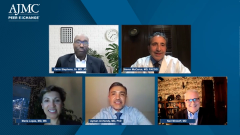
Patient-Centered Care in Women’s Health
This expert panel considers an increasing collaborative effort between payers, patients, and providers for patient-centered care.
Episodes in this series

Neil Minkoff, MD: One of the things that we were touching on a couple minutes ago was patient autonomy and shared decision-making. How does that play a role? I’ll start with you, Ayman. Talk about the role of shared decision-making in your practice and whether it’s something that you feel bubbles up into the decision-making process of coverage.
Ayman Al-Hendy, MD, PhD: I’m a big fan of [shared decision-making]. I tell the patient, “I’m a technician, and my job is to give you all the options out there. If you decide to go with medical [therapy], I prescribe it for you. If you want to do the surgery, I’ll be the technician doing the surgery.” I don’t make decisions. Steve, I’m sure this happens to you all the time. Today, it happened several times. “If I were your sister or wife, what would you do?” I say, “I’m not going to comment on this, because everybody is unique.”
Neil Minkoff, MD: “You’re the doctor.” How many times have you heard that phrase?
Ayman Al-Hendy, MD, PhD: Exactly. “Tell me what you think.” I use drawings and have tearable sheets, so I draw things and tear it and give it to the patient so she can think about it later and discuss it with her family. But I say, “No, I’m not going to answer that. I have given you all the options. If you have any questions, I can talk more about different options. But you have to decide. You’re the one who knows your circumstances and what’s important for you.” That’s my approach. I’ve been a big fan of the patient-centered decision process even before it became fashionable. I’ve been doing this all of my career.
Neil Minkoff, MD: Steve, anything to add to that?
Steven McCarus, MD, FACOG: Yes. I have a publication addressing this issue on shared decision-making, which I instituted a few years ago. It comes down to a medical legal issue as well. The patient needs to have the information on what her options are medically and surgically, and we always give patient handouts on what we’re proposing their best treatment is. I’m a fan of shared decision-making.
With the bit of exposure I’ve had to payers and insurance companies, there’s a missed opportunity in women’s health to provide them with more clinician member education, which is a spin-off of shared decision-making. It would be very easy to help your members. Maybe you all do it. Forgive me if you do. But you all control those members; they’re part of your organization. We’re talking about a segment of that: women’s health. There are a lot of issues in women’s health. I don’t think there’s enough information that the payer gives the member about these types of issues, which is part of shared decision-making. That should be on the onus of the payer and not only the clinician. I also think there’s an onus on the patient to do her own research and education. All of us together could do a better job.
Neil Minkoff, MD: It’s interesting that you say that, because 1 of the things that we struggle with—I’ll jump in with my former payer role—is getting caught between the physician or clinician and the patient. Why would they listen to us? They’re talking to their clinician. That’s whom they’re doing the shared decision-making with. There’s some uncertainty about the appropriate role of the payer in that decision-making, but I’m not against doing it. I’m just letting you know why there might be some hesitancy there.
Kevin Stephens, Sr. MD, JD: As mentioned, there’s another maybe 10% to 15% of women who have endometriosis, so if you cast out all this information, a lot of it’s going to waste. They just take it and put it in the garbage can. We have to use the diagnosis and make sure that we give the right person the right information at the right time. That’s somewhat of a challenge because we don’t want to interfere with the provider-patient relationship. It’s a tough space.
Maria Lopes, MD, MS: It’s a tough space, and there’s the health literacy component and cultural issues. One of the things I’ve seen with some degree of success has come from an integrated system approach, where there’s concern about the cost of care. This isn’t just for hysterectomies, but for elective procedures where the patients are required to watch a video that takes them through the different options, including surgery, and not just short-term risk, but long-term risk, long-term potential complications, and risk-benefit.
Dr McCarus talked about the limitations of time when he’s seeing that patient. The reality is that it isn’t going to get better with an aging population, more demand, and more consumerism. How can we develop something that’s more streamlined that helps patients be more informed, ask the right questions, and utilize that precious time with their doctor to go through what’s on their mind and what makes the best clinical sense for them?
Ayman Al-Hendy, MD, PhD: Absolutely. I have a quick comment, Neil. I like what Maria said about long-term complications. We and others have published on the long-term complications of hysterectomy. This is a nuanced thing. The last few years, it turned out that when you follow women who had hysterectomies—especially in their thirties—long-term, for 30 or 40 years, they have a higher risk of heart disease, dementia, and strokes. We published that, and there are others from Mayo Clinic, particularly Ebbie Stewart, MD, etc. It actually made it into the most recent guidelines from ACOG [American College of Obstetricians and Gynecologists] that long-term complications of hysterectomy should be discussed with the patient during the consenting session for hysterectomy.
One of our residents was looking for a project. I told her to survey the Chicago area for patients who had a hysterectomy from the hospital record, and 3% of the patients who had hysterectomies in the Chicago area in the last 2 to 3 years were counseled about long-term complications. I agree with Steve. That’s a space where somebody needs to jump in. We’re working with the patient advocacy groups and so on, but the payers also can help.
Transcripts edited for clarity.
Newsletter
Stay ahead of policy, cost, and value—subscribe to AJMC for expert insights at the intersection of clinical care and health economics.











